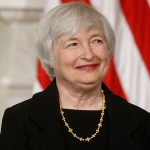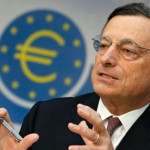
By Jonathan Chevreau
One of the more entertaining financial presentations at this week’s BMO investing conference in Chicago was a keynote talk by author and broadcaster Andrew Busch on who killed the global economy. (I qualify this with the phrase financial presentations because Rick Mercer’s talk was also highly entertaining but could hardly qualify as being financial).
By contrast, Busch had worked at BMO Capital Markets for 22 years earlier in his career and grew up in Chicago. His financial research is available free here.
Billing his talk as a “Murder Mystery,” he ran movie clips from various Film Noirs to illustrate his points.
Among his suspects; the ECB’s Mario Draghi, Japan prime minister Shinzo Abe, China president Xi Jinping and the Federal Reserve’s Janet Yellen. Busch played the role of “Private Economic Investigator.”
Resemblance to Greece?

Starting with Yellen, he submitted clue number 1 as the unemployment rate. With 3 million Americans underemployed, this fact shows up in sluggish wage increases so “we’re not seeing an acceleration in wealth gains so are not seeing inflation.” What jumps out from the latest job numbers is where they are located; 14 million Americans are employed in local government, another 2.7 million in the federal government and 5 million more in the states. “Now we know why it’s important to look at government spending,” Busch said, “We have to pay tax to have them employed.” Sequing to Greece he asked rhetorically “Are we more like them than we realize?”
Clue # 2 pointing to Yellen is GDP, which slowed down from 5% in the third quarter to 2.3%. “This quarter will be bad and earnings won’t be good.” So far, markets are ignoring pre-warnings as the S&P500 stalls around 2100 but the earnings hit will be “substantive,” Busch said. However, “Most are ignoring it for good reason: we will snap back in the second quarter with GDP growth close to 3% as warm weather comes and things return to normal but we will hear lots about potentially negative GDP in the first quarter.”
The slump in energy prices has curbed inflation, which is “short-term bad but medium-term good because of more money in consumer’s pockets.” Cheap oil helps middle-income earners heat their homes and fill their cars’ gas tanks. That should translate into a pickup in consumer spending and accounts for the recent strength of consumer discretionary stocks.
The Fed’s motive is to normalize interest rates and its first opportunity to raise them will be in June. But the Fed itself is still not sure when inflation and average hourly earnings will go up. “We don’t know what the Fed will do because they don’t know.” The process has begun with hikes in the minimum wage at major retailers like Walmart, Target and even McDonalds. “At some point the Fed will act and I believe it will be in June.”
Dead Man Walking

Busch then moved to Suspect #2 (Mario Draghi) by rolling another film clip. Clue #1 in Europe is that employment rates are just starting to tick down. Clue #2 is the GDP growth rate, which is above zero. “We’re starting to see some acceleration. That’s great but I’m not sure it will last.”
Clue #3 is a major problem: the “sinking feeling” on Europe’s inflation numbers. To avoid Japan’s fate of 15 years of deflation, Europe has mimicked the Fed’s Quantitative Easing program by launching its own QE program in March, lowering rates to zero. It’s bought 60 billion worth of Euros and added 1.1 trillion Euros to the balance sheet, moving beyond 3 trillion. The difference is that when it started its program, the Fed only had US$800 billion on its balance sheet, with QE eventually taking it to US$4.4 trillion. “I expect the ECB will mimic that and do it in three or four tranches.”
Suspects 3 & 4: Japan & China
Busch moved on to Shinzo Abe and Xi Jinping, showing a photograph of the two shaking hands and clearly uncomfortable with each other. Clue 1 is their unemployment rates but these can be safely ignored because the numbers are clearly unknowable. China’s unemployment rate has “magically” stayed at almost exactly 4% since 2012. Japan has horrendous productivity numbers and are “like zombies in the Walking Dead: they should be firing people.”
Clue #2 is GDP. China can force its banks to lend, which it did in 2009, when its high-velocity money stimulated economic growth in areas like infrastructure and housing. This resulted in inflation heating up and commodity inflation but the country is attempting to shift to more US-like consumer spending.
In the US, consumer spending accounts for 70% of GDP, while it’s only 40 to 45% in China. “They want it higher,” Busch said, so it relies less on infrastructure spending. In both countries, politicians “tell central banks what to do.” Abe shot the three arrows of huge fiscal stimulus, massive QE and economic reform in a bid to generate 2% inflation within two years. But last month inflation in Japan was “zero, so they missed the target. It’s vastly different from QE in the ECB and US. … It’s not surprising to see their (Japan’s) stock market reach 15-year highs this week as they reaffirm the QE path, and it won’t end any time soon.”
China wants to keep its currency weak relative to the US dollar and has cut rates twice. The results have been dramatic: Chinese stocks have been on fire since September.
And the murderer is:
In his finale, Busch concluded “the dame did it.” (Yellin). While he expects the Fed will start to raise rates in June, “Nothing is going to happen.” Busch said what happens next may be similar to the 1930s, when the Fed moved rates up several times aggressively. At first, nothing happened but they kept doing it until “eventually they killed the recovery. That’s analogous to what will happen here.”
Here, Busch ran a movie clip from Sunset Boulevard. “The first time the Fed shoots the guy nothing will happen. He’ll keep walking. But the third time they shoot you, you end up face down in the pool.”
So far, they’ve not yet killed the global recovery but central banks everywhere “want all of us in this room to go as far out on the risk curve as possible.” The Fed “won’t screw up this year or the first half of 2016,” Busch predicted, “My guess is that by the second half of 2016 or first half of 2017, as Europe and China stabilize they will feel good enough to act more aggressively.”


Hi Jon,
I guess people find it fun to speculate but most predictions are worthless in my humble opinion. I wish we could get past this desire for predictability and just embrace the fact that that we must live with the uncertainty.
Cheers,
Mike